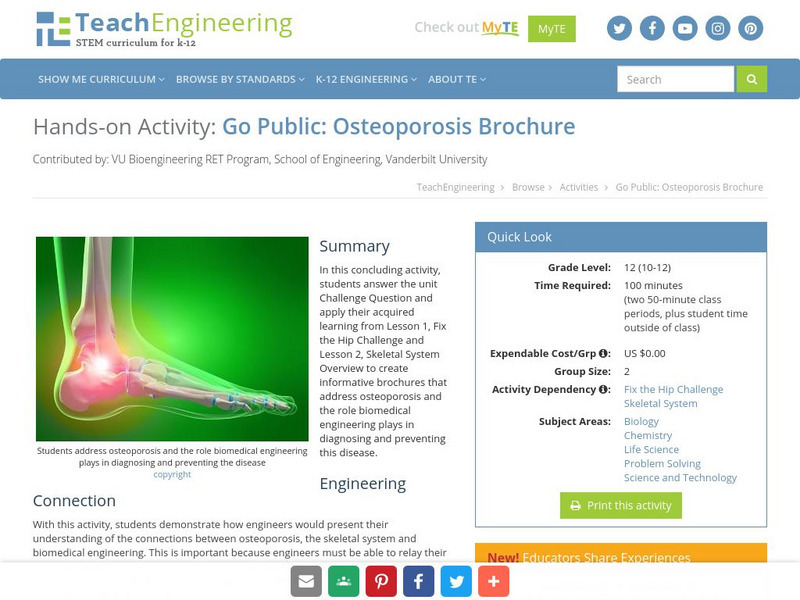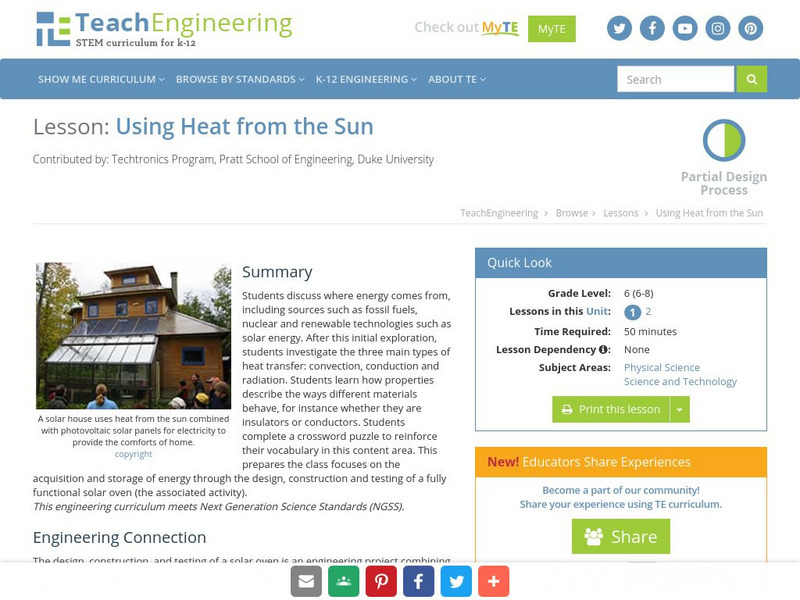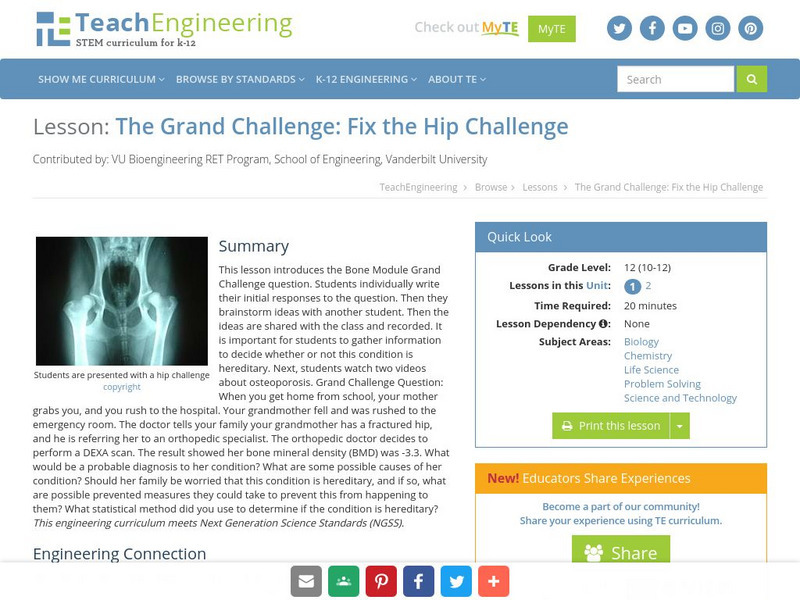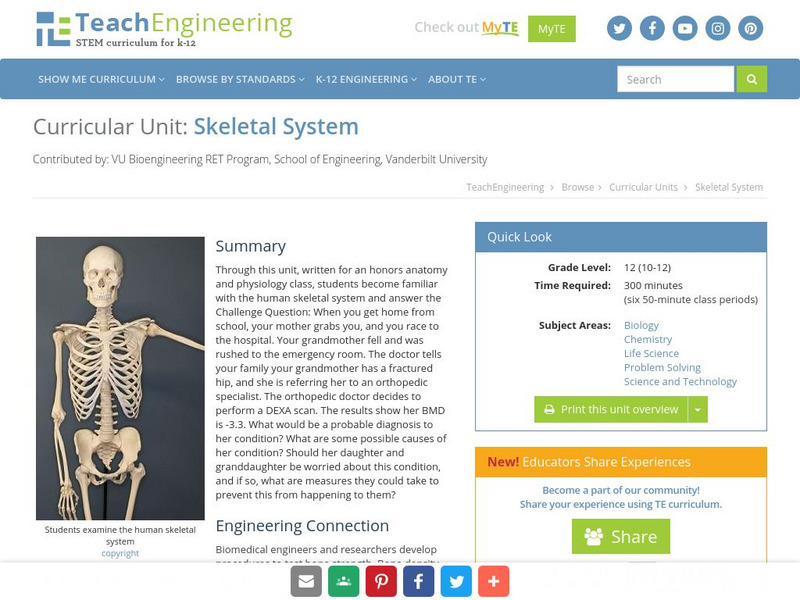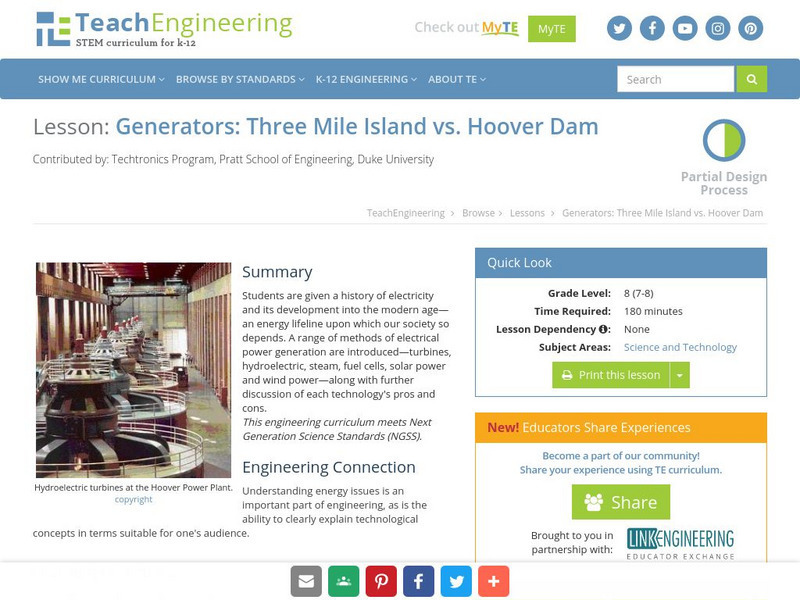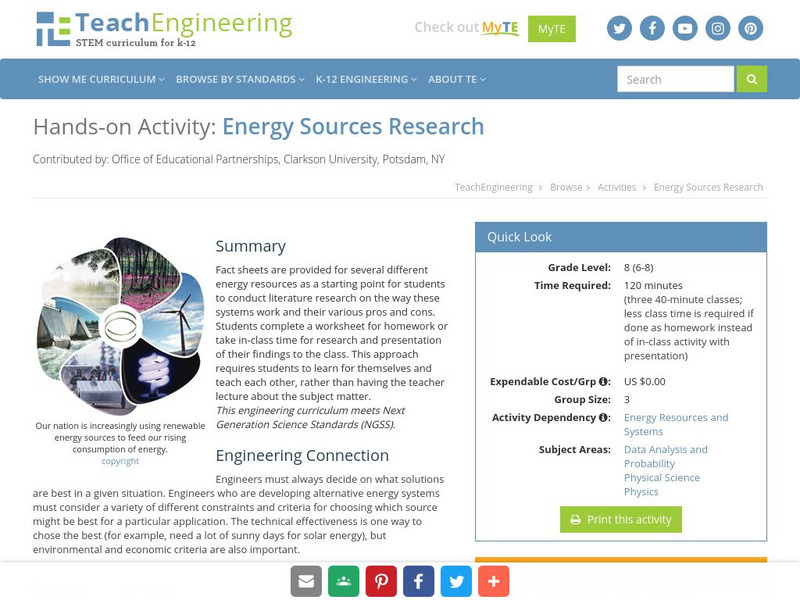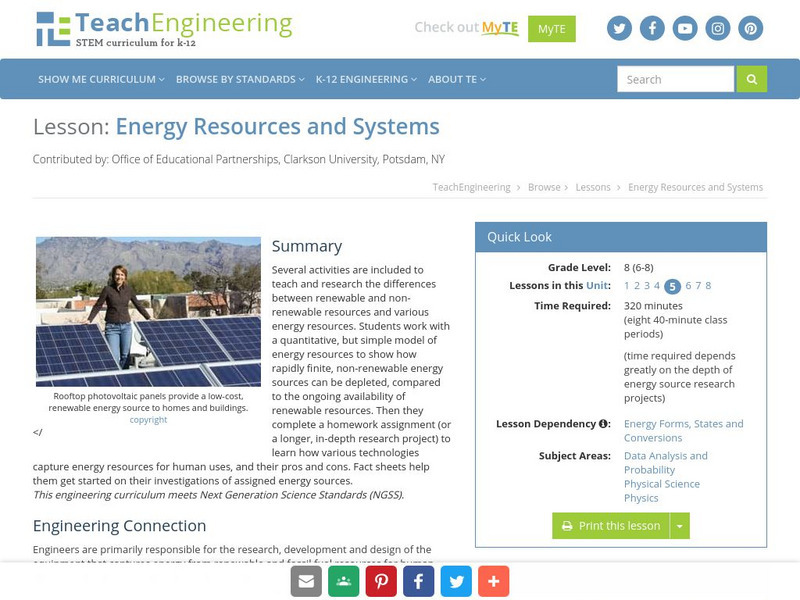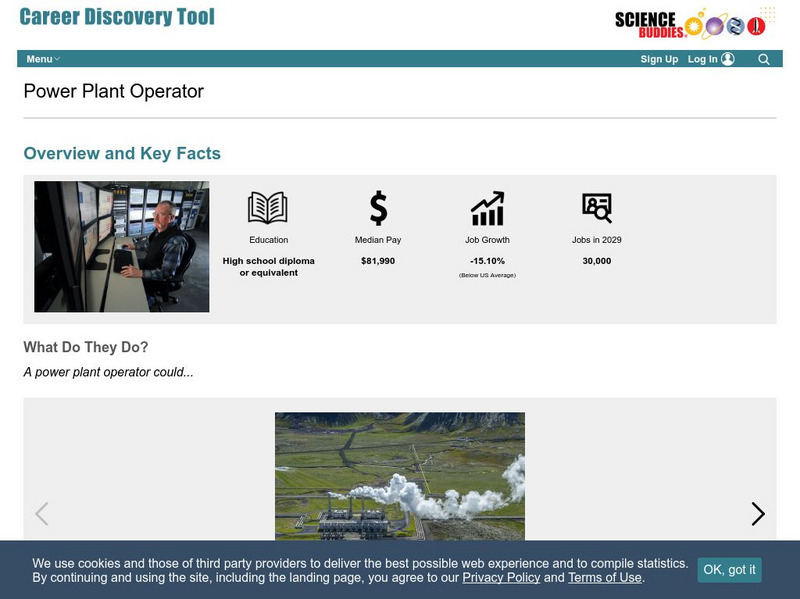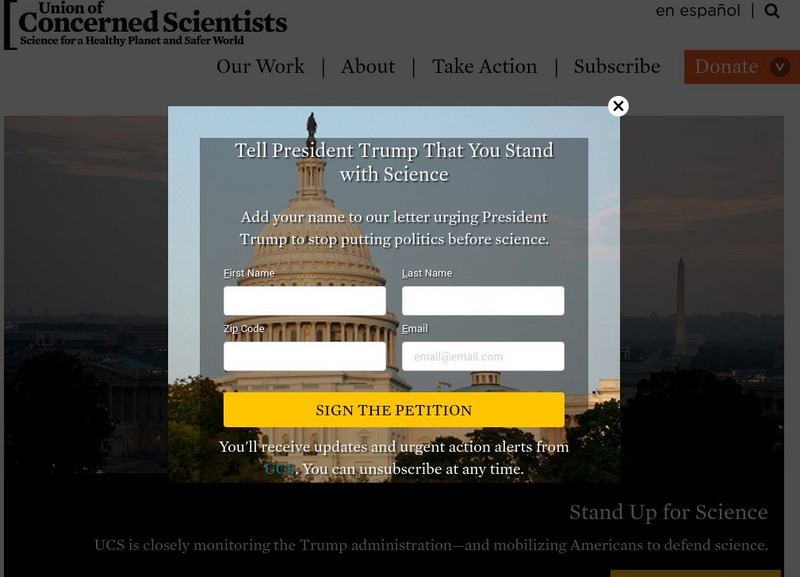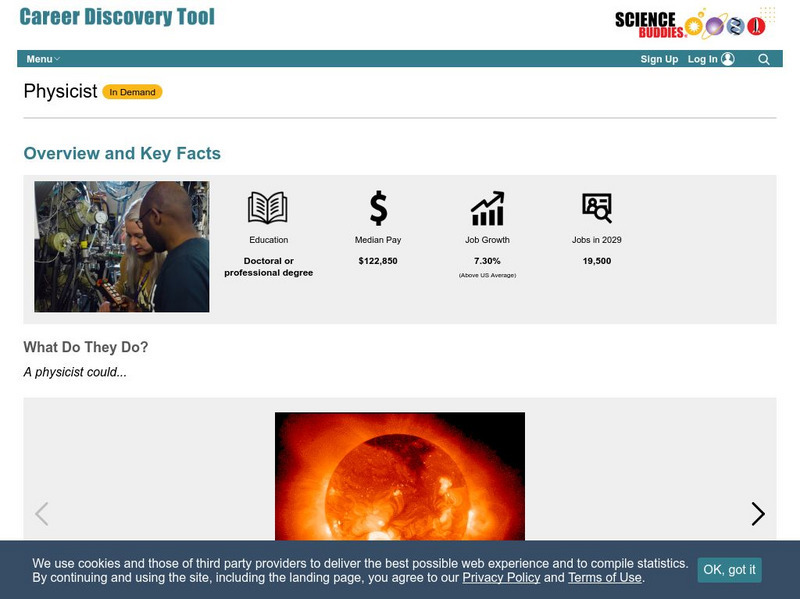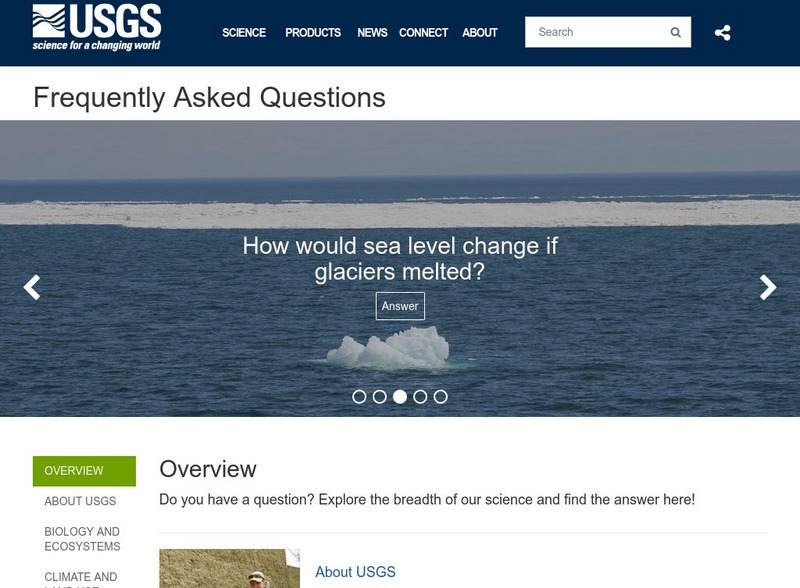TeachEngineering
Teach Engineering: Go Public: Osteoporosis Brochure
Students will answer the Challenge Question and use the acquired learning from Lesson 1, "Fix the Hip Challenge" and Lesson 2, "Skeletal System Overview"to construct an informative brochure addressing osteoporosis and the role biomedical...
TeachEngineering
Teach Engineering: Energy Forms and States Demonstrations
Demonstrations explain the concepts of energy forms (sound, chemical, radiant [light], electrical, atomic [nuclear], mechanical, thermal [heat]) and states (potential, kinetic).
TeachEngineering
Teach Engineering: Using Heat From the Sun
In this lesson, students will first discuss where energy comes from, including sources such as fossil fuels, nuclear, and such renewable technologies as solar. After this initial exploration, students will investigate the three main...
TeachEngineering
Teach Engineering: Rolling Blackouts & Environmental Impact
The goal is for the students to understand the environmental design considerations required when generating electricity. The electric power that we use every day at home and work is generated by a variety of power plants. Power plants...
TeachEngineering
Teach Engineering: The Grand Challenge: Fix the Hip Challenge
This lesson plan introduces the Bone Module Grand Challenge question. Learners are asked to write their initial responses to the question alone. They will then brainstorm ideas with one other student. Finally, the ideas are shared with...
TeachEngineering
Teach Engineering: Skeletal System
Through this unit, written for an honors anatomy and physiology class, students become familiar with the human skeletal system and answer the Challenge Question: When you get home from school, your mother grabs you, and you race to the...
TeachEngineering
Teach Engineering: Generators: Three Mile Island vs. Hoover Dam
Students are given a history of electricity and its development into the modern age lifeline upon which we so depend. The methods of power generation are introduced, and further discussion of each technology's pros and cons follows.
Simon Fraser University
Chem1 Virtual Textbook: What Is a Heat Engine and Why Should You Care?
With an overview of topics related to chemical equilibrium, this site provides a foundation to a study of thermodynamics and heat engines. Other topics covered include the fall of heat, nuclear plants, and more.
PBS
Pbs Learning Media: Nuclear Reaction: Searching for Safety
This text excerpt from "Beyond Engineering: How Society Shapes Technology" by Robert Pool looks at the impact of nuclear power. Reprinted on the online home of FRONTLINE, the series on PBS.
University of Utah
University of Utah: Learn Genetics: Click and Clone
Practice the steps of cloning in this interactive animation. Using what you know about somatic cell nuclear transfer, your mission is to create a genetically identical clone of Mimi, a brown female mouse. You'll answer a few questions at...
Other
National Academy of Engineering: Hyman George Rickover
Biographical information about Hyman G. Rickover.
TeachEngineering
Teach Engineering: Energy Sources Research
Fact sheets are provided for several different energy resources as a starting point for students to conduct literature research on the way these systems work and their various pros and cons. Students complete a worksheet for homework or...
TeachEngineering
Teach Engineering: What Is Going on With Grandma?
Students are introduced to the concepts of the challenge question. First independently, and then in small groups, they generate ideas for solving the grand challenge introduced in the associated lesson: Your grandmother has a fractured...
TeachEngineering
Teach Engineering: What Makes Our Bones Strong?
Students will use this activity to determine what keeps our bones strong. Soaking the bones in vinegar will remove the calcium from the bones causing them to become soft and rubbery. Students will find that when we age, calcium is...
TeachEngineering
Teach Engineering: Energy Systems
Posters are provided for several different energy conversion systems. Students are provided with cards that give the name and a description of each of the components in an energy system. They match these with the figures on the diagram....
TeachEngineering
Teach Engineering: Energy Resources and Systems
Several activities are included to teach and research the differences between renewable and non-renewable resources and various energy resources. Learners work with a quantitative, but simple model of energy resources to show how rapidly...
Science Buddies
Science Buddies: Career Profile: Power Plant Operator
Keeping the power moving to houses and businesses is the job of the power plant operator. Whether the power comes from hyrdroelectric, nuclear, or coal energy, the power plant operator needs to know how to keep the turbines moving. This...
Other
Union of Concerned Scientists: Science for a Healthy Planet and Safer World
The official website for Union of Concerned Scientists provides information on environmental issues and suggestions on actions people can take to curb environmental harm.
Khan Academy
Khan Academy: Energy Through Time
The quest for energy has always been a balancing act. As humans have gained greater control over their environment, they've found abundant resources - and faced numerous challenges. This article traces the history of our quest for energy.
Other
Planet Ark: World Environmental News
Welcome to Planet Ark's daily Reuters World Environment News - the most comprehensive source of environmental news on the Net. To read previous news stories, please use the search engine below to find stories relating to any...
Science Buddies
Science Buddies: Career Profile: Physicist
Physicist as a career is a very broad spectrum. This site from Science Buddies relates the general requirements and education needed to be a physicist and lists the many sub-fields in which physicists can specialize. Included is a video...
Wikimedia
Wikipedia: Rocket
Wikipedia provides an encyclopedia definition of a rocket, including information on rocket history, size, types, and more.
US Geological Survey
Usgs: Earthquakes Frequently Asked Questions
Use this resource to find answers to frequently asked questions about earthquakes.


